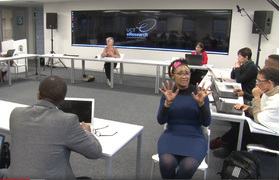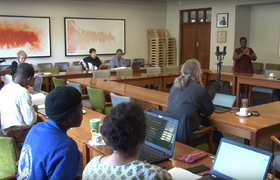Outsourcing is most efficient, cost effective option for UCT support services
06 October 2015 | UCT Communication and Marketing DepartmentThe University of Cape Town notes the demands by members of Rhodes Must Fall (RMF), the National Education Health and Allied Workers Union (NEHAWU) and other movements to abolish outsourcing of essential services at the university.
The UCT Council called for a review of outsourcing in 2014. The Report on Outsourcing at UCT, dated 14 April 2014, estimates that the total additional costs of insourcing all services at the university would be R58 million a year, with additional upfront asset purchase costs of R68 million. The university will not be able to absorb this cost without raising student tuition fees significantly, and this would impair student access to UCT.
In addition, the report finds that the efficiency of the services that are outsourced at UCT is another strong argument to retain the policy, as it allows the university to concentrate on our core focus of teaching and research.
The report confirms the value of the Code of Conduct that UCT incorporates into its outsourcing agreements, and encourages a strengthening of this Code to ensure that outsourced workers at UCT “have voice in the form of structured representation within the workplace”. One response by the university to this recommendation is, the establishment earlier this year, of the position of a Code of Conduct Compliance Officer to work closely with outsourced companies on behalf of the workers. The broad areas covered in the Code of Conduct include freedom of association and collective bargaining, working conditions, the minimum wage and other conditions such as working hours, overtime, night shift allowance and payment while on maternity leave.
UCT notes the statements made by protesters about the conditions experienced by workers in outsourced companies and we respond as follows:
|
Protesters' allegation |
UCT response |
|
Workers' wages were significantly reduced by outsourcing. |
The UCT minimum wage for outsourced workers is R5018 pm. The Sectoral Determination hourly rate is R16.98. This amounts to just under R3000 per month (basis: 40hr working week; 4.33 weeks per month). The UCT minimum is at least 66% higher than that prescribed by the Minister of Labour in this sector. |
|
Workers lost benefits such as fee rebates for their children attending university. |
UCT has extended its “workers' benefit” to include outsourced workers. The benefit provides reduced tuition rates for outsourced workers and their legally determined dependents. |
|
Workers often face intimidation, victimisation and unfair dismissal. |
UCT's Code of Conduct ensures that employees are treated fairly and in accordance with the law. In 2014 UCT agreed to establish an independent arbitration process to resolve disputes between outsourced service providers and their employees, in the event that the internal process has been followed without reaching a resolution. |
|
NEHAWU calls for a halt to the transfer of workers from one contract to another. |
This clause has been included in UCT's outsourcing contracts to allow the same workers to continue in their jobs at the university even when the outsourcing contract changes from one company to another. This ensures workers can keep their jobs even if a contract is discontinued. |
It is important to note, within the context of today's protest action, that UCT has two kinds of contractual relationships that are under scrutiny by RMF.
-
Outsourcing contracts with six service providers: Supercare (cleaning of campus and offices), G4S (security), Metro Cleaning Services (cleaning of residences), C3 Food Services (residence catering), Sibanye (Jammie Shuttle driving) and Turfworks (gardening maintenance). These contracts are guided by the Code of Conduct to ensure a minimum wage and other benefits to workers.
-
Vendor contracts with companies that provide retail services to students and staff on campus, such as food take-aways and other retail sales. Currently these contracts cover only the rental of retail space to vendors.
Statement on boycott of food vendors
It has been brought to UCT's attention that student groups have organised a boycott of some food vendor outlets on campus. The boycott is in response to allegations of victimisation of some workers at the food vendor outlets. It is also alleged that the company has not recognised the employees' trade union.
UCT recognises that all employers must abide by the requirements of the relevant laws in trading and fair labour practice. This includes freedom of association, the right to join trade unions and protection from victimisation.
The food vendors rent space from UCT, but are otherwise independent of UCT and UCT has no right to intervene in the relationship between the employer and their employees. We will, however, request an independent audit of the employment practices of, and wages paid, by all food vendors on campus.
While we acknowledge the right to boycott as a legitimate form of protest, we emphasise that students, staff and other individuals on campus also have the right to access the services of these vendors if they so choose, and protestors may not obstruct access to the outlets.
Issued by: UCT Communication and Marketing Department.
 This work is licensed under a Creative Commons Attribution-NoDerivatives 4.0 International License.
This work is licensed under a Creative Commons Attribution-NoDerivatives 4.0 International License.
Please view the republishing articles page for more information.









